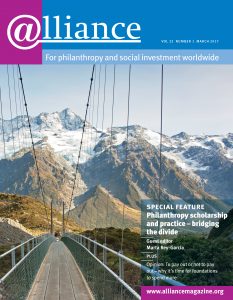Indiana’s Lilly Family School of Philanthropy has launched a professional doctorate in philanthropic leadership – the first degree of its kind.
Most people interested in philanthropy are ‘doers,’ seeking to make a meaningful social contribution. But what they can accomplish depends on what they know, so there is an understandable thirst for practical knowledge that will survive the journey from anecdote to best practice, and then to a general principle that can be thoughtfully applied in many contexts.

Read Alliance magazine’s issue on Philanthropy scholarship and practice – bridging the divide
Academic research on philanthropy has grown significantly at a time when professional practice is also evolving rapidly. There is an increasing need for bridges that connect scholarship and research with practical knowledge. This is why the Indiana University Lilly Family School of Philanthropy recently launched the Professional Doctorate in Philanthropic Leadership (PhilD).
The PhilD will allow highly capable leaders to focus on a specific problem and seek to advance solutions by applying research while engaging mentors and fellow leaders. Professional doctorates are not uncommon in other fields, but to our knowledge this is the first one that has been crafted to advance the practical knowledge of philanthropy.
The premise of the PhilD is students creating applied projects at the frontier of knowledge with others who are in the academy, the world of practice, and in the communities they seek to benefit. The current philanthropic landscape is replete with issues crucial to civil society, including cross-sectoral collaborations, the impact of technology and climate change, disparities of various kinds, and the urgency of justice, equity and inclusion in communities everywhere.
The PhilD is different from a PhD in that the latter degree prepares one to generate new knowledge and to teach. Professional doctorates focus on utilizing existing research to apply to critical issues in the field while integrating practice-based knowledge. Through their professional practice lens, professional doctorates yield a wide range of impact, reaching a broad audience to engaged on-the-ground outcomes.
Our PhilD students will pursue learning outcomes in three areas: philanthropy, leadership, and inquiry. Combining expertise in philanthropy and leadership with techniques of inquiry will enable them to craft an applied project they will refine and develop throughout their coursework. In the final, third year, students will complete the project and engage stakeholders in its implementation. A broad range of faculty from Indiana University as well as professionals with the expertise to contribute will support the leadership goals of our students and their contributions to the philanthropic sector.
The faculty are joined by new director of the PhilD, Cindy M. Lott. As a clinical professor of philanthropic studies, Lott also serves as the Stead Policy Fellow. In addition to her background in innovating new university programs, Lott is active with policy practitioners, having served on the IRS Advisory Committee on Taxation and having developed a program for the state attorneys general (regulators of the nonprofit sector in the U.S.) at Columbia University, where she previously taught.
Emphasized across the curriculum is a rigorous ethical framework, also showing how power in philanthropy can be used well. Indeed, wielding power openly and coaching others to deploy their power purposefully can help lead social advances.
What kinds of students will purse the PhilD? Senior leaders for the public good from various professional walks are expected to apply. We welcome applicants from diverse backgrounds of every sort: practice areas, geography, private and governmental sectors as well as communities that historically have been underrepresented in formal philanthropy. The Lilly Family School of Philanthropy is committed to increasing diversity in our field, and we intend to reflect this urgency in our student cohort and faculty for the PhilD.
The applied research project that is the culmination of the PhilD affords students the opportunity to undertake inquiries that will help advance their careers as well as serve the philanthropic field more broadly. Perhaps a long-serving strategic advisor is keen to develop a project that could demonstrate their readiness to assume the leadership of an organization. An emerging leader may want to demonstrate a synthetic approach to her segment of the field that will also support her rise to the C-suite. Alternatively, a seasoned leader may tackle an issue to propose a model solution that could be replicated across the field. And there are impact investing or social enterprise puzzles in one domain from which cross-sectoral solutions could be extrapolated. We anticipate that our applicants will come to us with a variety of projects that will surprise us with their relevance and creativity.
If we succeed in spurring philanthropic innovation and idea generation, we will help leaders who reflect the communities they serve generate powerful insights to inform action. The PhilD projects will be available to the public, providing access to all who have the curiosity and interest to know more in order to better pursue their philanthropic goals.
We welcome you to learn more with us and to share your impressions of the PhilD. As a community of educators and professionals, we seek the perspectives of those we serve. Join us as we create a new level of professional education and engagement at the Indiana university Lilly Family School of Philanthropy.
Amir Pasic, PhD, is the Eugene R. Tempel Dean and Professor of Philanthropic Studies at the Lilly Family School of Philanthropy at Indiana University.



Comments (0)